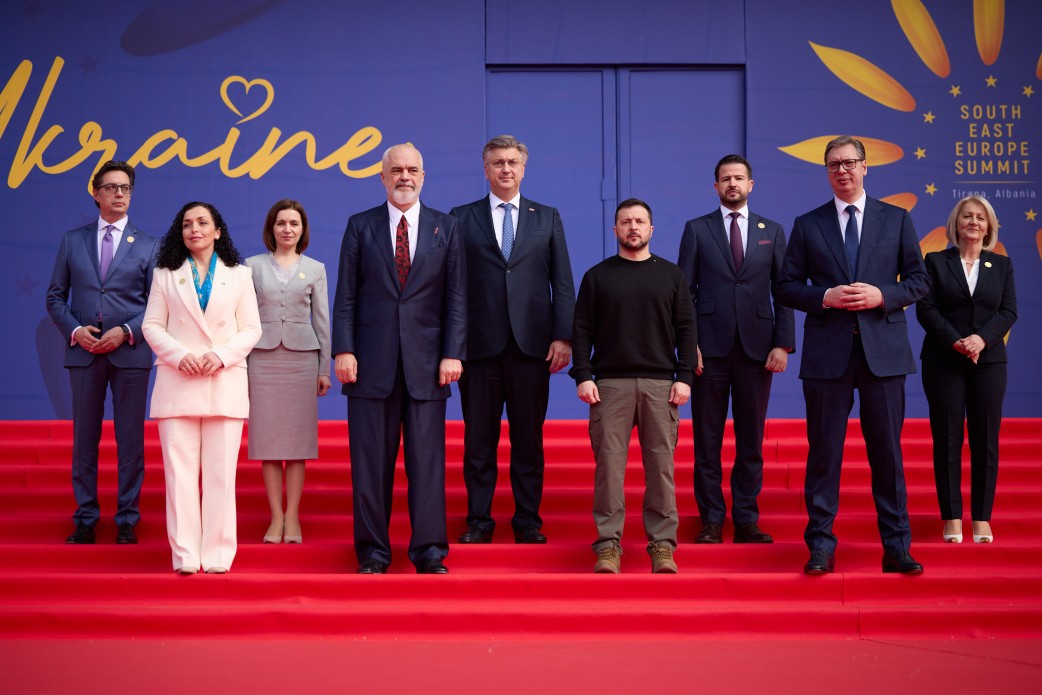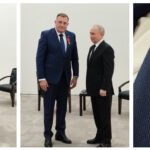The Ukraine – South East Europe summit, hosted by Tirana on February 28, was first of all intended to serve as a symbolic act of support for Ukrainians from the countries in the region. And that goal has indeed been achieved: Russia was clearly and unequivocally branded “aggressor”, and Ukraine heard vows of support “for as long as it takes” to defeat the aggressor and achieve a just peace.
Meanwhile, moving a bit away from general statements and promises and toward pragmatic specifics, we can see a significant difference in the content of such support, offered by different actors.
Declaration of condemnation and support
The final document of the Tirana event was the Summit Declaration, which was supported by the leaders of Kosovo, Moldova, Montenegro, North Macedonia, Serbia, Ukraine, Albania, Bosnia and Herzegovina, Bulgaria, Croatia, and Romania – presidents Vjosa Osmani, Maia Sandu, Jakov Milatovic, Stevo Pendarovski, Aleksandar Vucic, and Volodymyr Zelensky, Prime Ministers Edi Rama, Borjana Kristo (Chairman of the BiH Council of Ministers), Nikolai Denkov, Andrej Plenkovic, and Ion-Marcel Ciolacu.
The key messages in the Declaration included condemnation of “Russia’s unprovoked military aggression against Ukraine,” which “remains the greatest threat to the European security and international peace.” The act of aggression was defined as “unacceptable” and referred to as a flagrant violation of international law, including the UN Charter, and “a crime against the Ukrainian people.”
The participants in the summit reiterated their “unwavering support for the independence, sovereignty, and territorial integrity of Ukraine within its internationally recognized borders as of 1991.”
The countries emphasized that they remain “committed to providing Ukraine with necessary support to prevail against the Russian war of aggression for as long as it takes in order to achieve a comprehensive, just and lasting peace.” At the same time, it is noted that the future victory and peace should be based on the UN Charter and “the Ukrainian Peace Formula”, which further emphasizes the readiness to support Kyiv’s vision of ways to end the war. Expanding this thesis, the participants expressed readiness to participate in the implementation of the Peace Formula put forward by President Volodymyr Zelensky of Ukraine, which is in line with the Purposes and Principles of the UN Charter, and to participate in the inaugural Peace Summit, ensuring the widest possible international participation in this process.
The Declaration also emphasizes “firm commitment to bring to justice those individuals responsible for the crime of aggression, crimes against humanity and other atrocity crimes under international law committed in connection with Russia’s war of aggression against Ukraine, through appropriate, fair and independent investigations and prosecution at the national or international level”.
The signatories also “agreed to cooperate and focus our efforts on the return of unlawfully and illegally deported and forcibly relocated Ukrainian children.”
Separately, the Declaration laid down support for Ukraine’s European integration and Euro-Atlantic aspirations; strengthening joint efforts against hybrid threats related to disinformation and cybersecurity challenges; commitment to participate in Ukraine’s post-war recovery and demining efforts.
Special Serbia
Let’s note once again that, despite the framework nature of the Declaration, its fairly harsh wording saw support from all summit participants, including Serbia. According to the country’s president, Aleksandar Vučić, the clause on imposing sanctions on Russia was removed from the Declaration at his request. However, the mention of sanctions, which Serbia categorically refuses to introduce, would not make the Declaration much more radical. Therefore, Serbian president’s signature is undoubtedly an important step toward Kyiv.
The reason for this kind of policy pursued by Belgrade is quite clear. That reason is Kosovo.
During a meeting with journalists in Tirana, Vučić emphasized the importance for Serbia of the fact that Ukraine never recognized Kosovo, therefore it is seen as one of the few countries that can talk about territorial integrity, as it has not “trampled” the rights of others.
However, despite willingness to keep Kyiv from any moves toward Pristina whatsoever, Belgrade currently limits its support for Kyiv to political declarations and occasional support for international resolutions that in one way or the other condemn Russia’s aggression against Ukraine. None of the more practical steps, such as the introduction of sanctions against Moscow or military aid to Kyiv are so far on the table, and neither are changes in Belgrade’s policy on the issue. Commenting on the outcome of the Tirana forum, Vučić separately emphasized that Serbia had not signed any agreements with the Ukrainian leader on cooperation regarding weapons or ammunition.
Volodymyr Zelensky also confirmed that the rather limited content of Serbian-Ukrainian friendship will be preserved. According to him, during the meeting with the president of Serbia, the parties “coordinated further contacts with the aim of ensuring support for the Peace Formula from as many countries as possible.” This is about continuing diplomatic cooperation on international platforms, not about moving to a new level that would involve Russia sanctions and arms for Ukraine.
As for Kosovo, officials in Pristina support Ukraine as best they can. But even this does not give the Republic confidence in eventually sealing recognition in Kyiv.
Plans for Albania
Unlike Serbia, Albania, which co-hosted the summit with Ukraine, was one of the first nations to send military aid to Ukraine after Russia’s full-scale invasion. These were not “blankets and helmets”, but lethal weapons and ammunition.
Currently, Albania is among the TOP 10 countries in terms of Ukraine aid per capita, intending to further develop this cooperation. Another issue is that the potential of their support is rather limited as Albania has no own defense industry as such.
Commenting on Zelensky’s proposal regarding joint production of weapons and ammunition with the countries across the region, which the Ukrainian president voiced at the summit, Prime Minister Edi Rama of Albania noted that, although there are no defense industry capacities in Albania, negotiations are already underway with partners on bringing older infrastructure facilities back to life. This is a positive signal coming primarily for Kyiv, although Rama emphasized that Albania needs defense enterprises “first of all for its own sake.” “We are very well aware that we should invest more in defense, like everyone else, and we will do it,” the Albanian prime minister emphasized.
Regional dimension
Among other agreements reached at the summit in the field of defense, noteworthy is the one between the Ukrainian and Croatian governments on the joint production of drones, which Zelensky announced after meeting with Prime Minister Plenkovic.
Speaking about other countries that took part in the event, Bulgaria should be mentioned separately. Although Zelensky and Denkov held bilateral talks in Kyiv prior to the Tirana event, these negotiations are an integral part of Ukraine’s relations with South East Europe. Currently, it can be safely stated that Bulgaria’s support for Ukraine, including the defense aid, will continue. This is confirmed by the recent statement by Defense Minister Todor Tagarev, who announced a new batch of military assistance for Kyiv.
No reports were released of Zelensky’s talks with the Romanian prime minister, but it must be mentioned that Romania has been consistent in its support for Ukraine in the face of Russian aggression.
According to Zelensky, defense cooperation was discussed with other participants of the Tirana summit, including the North Macedonia president and and the head of the BiH government. The details of these negotiations were never reported but it is obvious that the relations with Skopje and with Sarajevo are completely different cases for Kyiv. North Macedonia (NATO Ally) is likely willing to continue supporting Ukraine, including with arms supplies, although it has no sufficient capabilities to this end. BiH, on the other hand, is home to several major producers of weapons systems, military equipment, and ammunition, but it remains a very difficult partner due to its domestic peculiarities, which are no secret to anyone so we will skip those in this piece.
Notably, despite Montenegro being a NATO Ally, Zelensky chose not to emphasize military cooperation with Podgorica when reporting on the meeting with President Milatović on the summit’s sidelines. The Ukrainian president only briefly noted that the two discussed medical treatment and rehabilitation of Ukrainian war veterans in Montenegro.
No agreements were mentioned on defense cooperation with Moldova. However, Kyiv has a special neighborly relationship with Chisinau, and currently the main topic of talks between Ukrainian and Moldovan top officials is primarily the situation of Transnistria. Zelensky’s talks with Sandu in Tirana were no exception.
***
In conclusion, it should be stated that the Ukraine – SEE Summit in Tirana played the role of a powerful communication platform for the countries of the region to be able to express unanimous support for Ukraine and agree on further steps. In addition, bilateral meetings with Zelensky allowed leaders to personify and diversify formats of support for the war-torn nation. Obviously, not all cases will involve arms supplies (unfortunately for Kyiv) but it is also obvious that, after the Tirana summit, it is finally clear that for the countries in South East Europe, failing to support Ukraine would mean going against the general trend.



